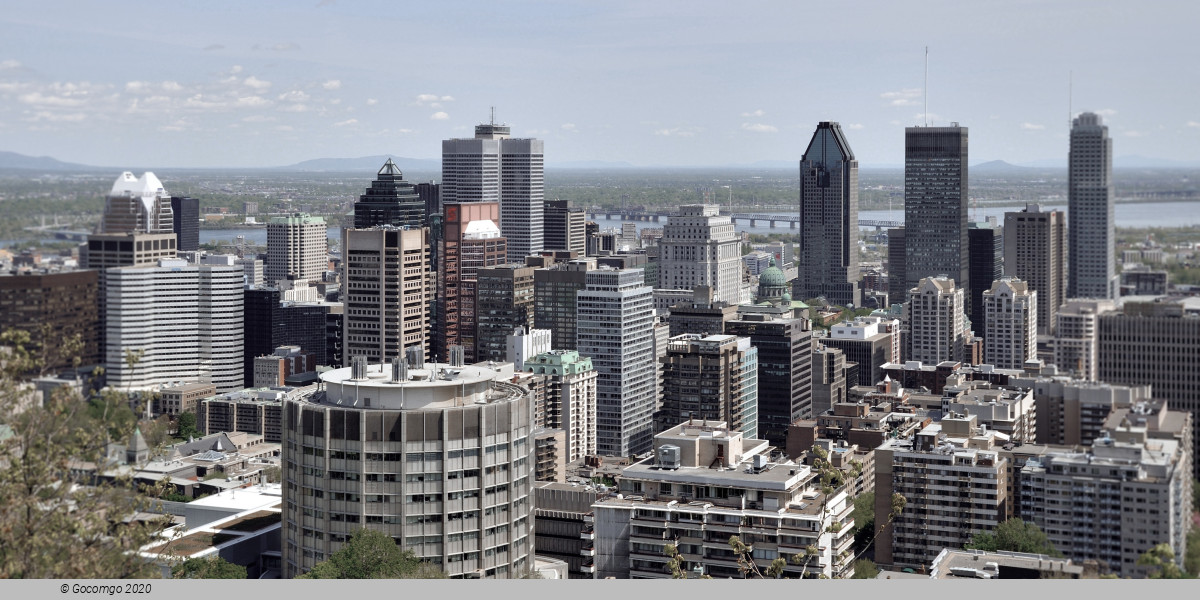Montreal

Montréal is the largest city in Canada's Québec province. It’s set on an island in the Saint Lawrence River and named after Mt. Royal, the triple-peaked hill at its heart. Its boroughs, many of which were once independent cities, include neighbourhoods ranging from cobblestoned, French colonial Vieux-Montréal – with the Gothic Revival Notre-Dame Basilica at its centre – to bohemian Plateau.
Montreal was referred to as "Canada's Cultural Capital" by Monocle magazine. The city is Canada's centre for French-language television productions, radio, theatre, film, multimedia, and print publishing. Montreal's many cultural communities have given it a distinct local culture. Montreal was designated as the World Book Capital for the year 2005 by UNESCO.
Being at the confluence of the French and the English traditions, Montreal has developed a unique and distinguished cultural face. The city has produced much talent in the fields of visual arts, theatre, dance, and music, with a tradition of producing both jazz and rock music. Another distinctive characteristic of cultural life is the vibrancy of its downtown, particularly during summer, prompted by cultural and social events, including its more than 100 annual festivals, the largest being the Montreal International Jazz Festival which is the largest jazz festival in the world. Other popular events include the Just for Laughs (largest comedy festival in the world), Montreal World Film Festival, Les FrancoFolies de Montréal, Nuits d'Afrique, Pop Montreal, Divers/Cité, Fierté Montréal and the Montreal Fireworks Festival, Igloofest, Piknic Electronik, Montréal en Lumiere, Osheaga, Heavy Montreal, Mode + Design, Montréal complètement cirque, MUTEK, Black and Blue, and many smaller festivals. The city of Montreal is also widely recognized for its diverse and vibrant night life, which is considered a vital part of the local cultural ecosystem.
A cultural heart of classical art and the venue for many summer festivals, the Place des Arts is a complex of different concert and theatre halls surrounding a large square in the eastern portion of downtown. Place des Arts has the headquarters of one of the world's foremost orchestras, the Montreal Symphony Orchestra. The Orchestre Métropolitain du Grand Montréal and the chamber orchestra I Musici de Montréal are two other well-regarded Montreal orchestras. Also performing at Place des Arts are the Opéra de Montréal and the city's chief ballet company Les Grands Ballets Canadiens. Internationally recognized avant-garde dance troupes such as Compagnie Marie Chouinard , La La La Human Steps, O Vertigo, and the Fondation Jean-Pierre Perreault have toured the world and worked with international popular artists on videos and concerts. The unique choreography of these troupes has paved the way for the success of the world-renowned Cirque du Soleil.
Nicknamed la ville aux cent clochers (the city of a hundred steeples), Montreal is renowned for its churches. There are an estimated 650 churches on the island, with 450 of them dating back to the 1800s or earlier. Mark Twain noted, "This is the first time I was ever in a city where you couldn't throw a brick without breaking a church window." The city has four Roman Catholic basilicas: Mary, Queen of the World Cathedral, Notre-Dame Basilica, St Patrick's Basilica, and Saint Joseph's Oratory. The Oratory is the largest church in Canada, with the second largest copper dome in the world, after Saint Peter's Basilica in Rome.
Beginning in the 1940s, Quebec literature began to shift from pastoral tales romanticising the French-Canadian countryside to writing set in the multicultural city of Montreal. Notable pioneering works describing the character of the city include Gabrielle Roy's 1945 novel Bonheur D'Occasion, translated as The Tin Flute, and Gwethalyn Graham's 1944 novel Earth and High Heaven. Subsequent writers of fiction who have set their work in Montreal have included Mordecai Richler, Claude Jasmin, Francine Noel, and Heather O'Neill, among many others.

